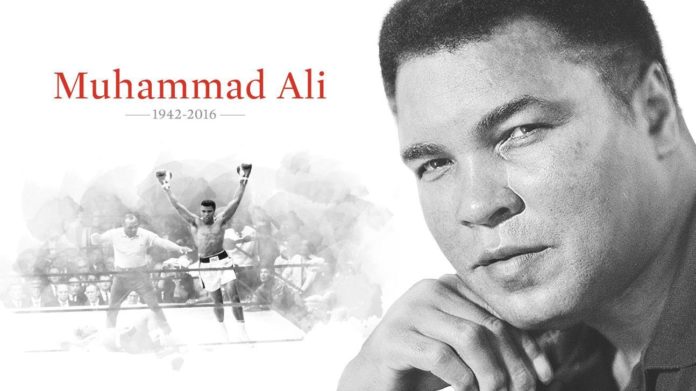
The heavyweight champion, Muhammad Ali, will always stand tall as the world’s greatest heavyweight boxing champion of the world. Now we only have memories to remember him by. He passed away at 74.

Muhammad Ali, who was known for his silver-tongue boxing career, as well as being a civil rights champion was once famously proclaimed by himself as “The Greatest.” He then spent his entire life living up to the billing.
Last Friday, at a Phoenix-Area hospital, Ali had died. He spent his last few days there being treated for sever respiratory complications, as stated from a family spokesman reporting to NBC News. The Greatest died at 74. Ali’s daughter, Rasheda, had stated that on early Saturday, the legend was “no longer suffering” and she described him as “Daddy, my best friend and hero.”
Even while Ali’s health declined, he never shied away from politics or controversy. He released a statement in December criticizing the Republican presidential candidate Donald Trump; his statement aimed at Trump’s proposal to ban the Muslims from entering the United States. “We as Muslims have to stand up to those who use Islam to advance their own personal agenda,” Ali stated.
This remark had further bookended the life of a single person who burst into the entire national consciousness back in the early 1960’s. Back then, Ali was known as the young heavyweight champion in which he converted to Islam and refused to serve in the Vietnam War. Ali went on to become a new symbol of strength, eloquence, conscience and courage. He was a well known anti-establishment showman that had transcended borders and barriers facing race and religion. His fights’ against his opponents became something spectacular to watch, but Ali would embrace far greater battles.
Born Cassius Marcellus Clay in January 17, 1942 in Louisville, Kentucky, to a pair of middle-class parents, Ali started his young passion for boxing when he was only 12-years old. Ali won the Golden Gloves title before heading into the 1960 Rome Olympics, where he won a gold medal as a light heavyweight.
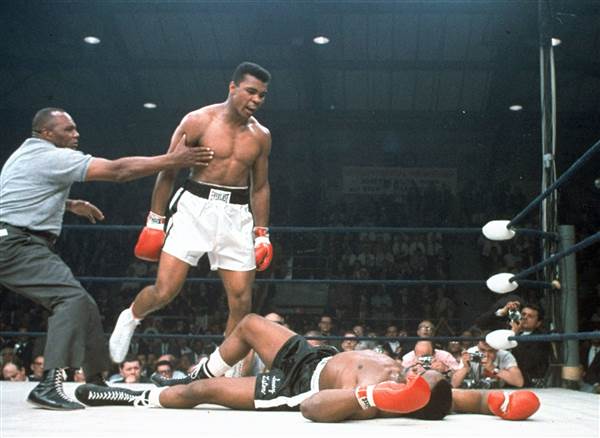
As Ali’s profile rose to the top, Ali would act out against those of American racism. Shortly after Ali’s Olympic win, he was refused services at a local soda fountain counter, and threw his Olympic gold medal into a nearby river as a means of protest.
Recoiling from the very tight knit community of several agents and other large promoters, Ali found guidance from the Nation of Islam. The American Muslim sect advocated his racial separation and rejected the pacifism of several of the civil rights movements. Being inspired by Malcolm X, which was one of the group’s leaders, he was converted in 1963. Ali would then keep his new faith secret until he knew that the boxing crown was safely his hands.
As a new champion, he renounced Cassius Clay as his former “slave name” and stated that from that point on, he would be called Muhammad Ali. This move had split sports fans and even the broader American Public: an American Sports champion rejecting his original birth name, thus adopting one in which sounded subversive.
Ali was extremely successful in defending his title against six other competitors, and one of those times was a rematch against Liston. Back in 1967, as the hight of the Vietnam War peaked, Ali was then drafted to serve in the United States Army. He stated previously that the Vietnam War did nothing to comport his faith, and Ali said that he had “no quarrel” with any of America’s enemy, the Vietcong. Ali refused to serve in the United States Army.
Stating “my conscience won’t let me go shoot my brother, or some darker people, some poor, hungry people in the mud, for big powerful America, and shoot them for what?” As said by Ali during an interview. “They never called me nigger. They never lynched me. They didn’t put no dogs on me.”
Ali’s stand was culminated at an April appearance at an Army recruiting station. It was there that he would refuse to step forward while his name was yelled out. The reactions were very much swift and harsh. Ali was completely stripped of his boxing title, and was convicted of draft evasion carrying a sentence of a total of 5 years in prison.
When Ali was released on appeal, he was unable to fight or leave the country, so then Ali then turned to the lecture circuit. He would speak at various college campuses, in which he would engage in heated debates, pointing out a hypocrisy of denying rights towards blacks as they were ordered to fight for the country.
“My enemy is the white people, not Vietcong’s or Chinese or Japanese,” Ali informed a white student that had challenged Ali’s draft avoidance. “You my opposer when I want freedom. You my opposer when I want justice. You my opposer when I want equality. You won’t even stand up for me in America for my religious beliefs and you want me to go somewhere and fight but you won’t even stand up for me here at home.”
Ali’s fiery comment was then praised by several anti-war activists and black nationalists, who were then vilified by conservatives.
Ali’s special appeal had taken him four long years to reach the U.S. Supreme Court. In June of 1971, the conviction was reversed in a unanimous decision. The Department of Justice was found to have acted improperly by telling the draft board that Ali’s stance was not at all motivated by his respective religious beliefs.
Ali’s Return to the Ring.
Breaching the end of Ali’s legal saga, Ali was issued with a boxing license. This would allow Ali to fight against Jerry Quarry, and not to any surprise, Ali came out on top like he always did. Just a few months later, during a sold-out show at the Madison Square Garden, Ali lost against Joe Frazier in a long 15 round duel. This match was touted as “The Fight of the Century.” It was also Ali’s first ever defeat as a professional boxer.
Ali and his opponent, Frazier, had fought again in 1974, just after Frazier lost his crown. Only this time, Ali had won during a unanimous decision. A decision in which would make Ali the lead challenger for his dream, the heavyweight title.
Ali took that title from the popular boxer, George Foreman, who later on that year at a fight in Zaire, was dubbed as “The Rumble in the Jungle.” Following the fight, there was a large 3 day music festival featuring James Brown and B.B. King. Finally, Ali delivered a well-known historical performance inside the ring, employing a new never-before-seen strategy, which he dubbed as the “Rope-A-Dope,” goading the well favored Foreman into attacking him – a maneuver that has since, been copied by several well-known champions.
Ali was 37 years old when he retired. However, while seeking to replenish his dwindling personal fortune, Ali returned to the ring in 1980 for a massive match against the current title holder, Larry Holmes. Unfortunately, Ali lost to Trevor Berbick just one year later. Finally, Ali was done and had retired for good.
One year later, Ali was diagnosed with Parkinson’s…But His Humanitarian Efforts Increased
Ali stated to the New York Times “I’m in no pain… A slight slurring of my speech, a little tremor. Nothing critical. If I was in perfect health – if I had won my last two fights – if I had no problem, people would be afraid of me. Now they feel sorry for me. They thought I was Superman. Now they can go, ‘He’s Human, like us. He has problems.’”
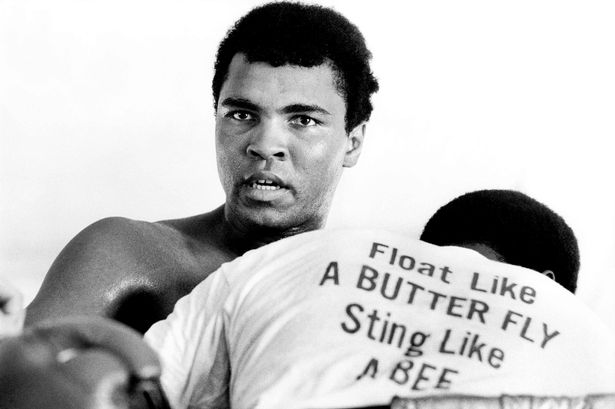
As Ali’s health plummeted, he switched to a more mainstream branches of Islam. Throwing himself into more humanitarian causes, he travelled to Lebanon in 1985 and then Iraq in 1990 to seek the release of several American hostages.
Ali continued to travel incessantly for several years, allowing him to crisscross the globe, making several appearances. for his philanthropic causes. Ali had met with presidents, royalty, heads of state, and even the Pope in an attempt to better the world. Ali claimed that he did not, for a second, regret boxing. He stated “If I wasn’t a boxer, I wouldn’t be famous, If I wasn’t famous, I wouldn’t be able to do what I’m doing now.”
It wasn’t until later on in 2005, when President George W. Bush had provided and honored Ali with the Presidential Medal of Freedom, that Ali’s hometown of Louisville had opened the Muhammad Ali Center, chronicling Ali’s life as a forum for promoting tolerance and respect.
Ali was divorced three times, and a known father of nine children. Ali informed People Magazine that his largest regret was not being able to play a more intimate role while raising his kids.
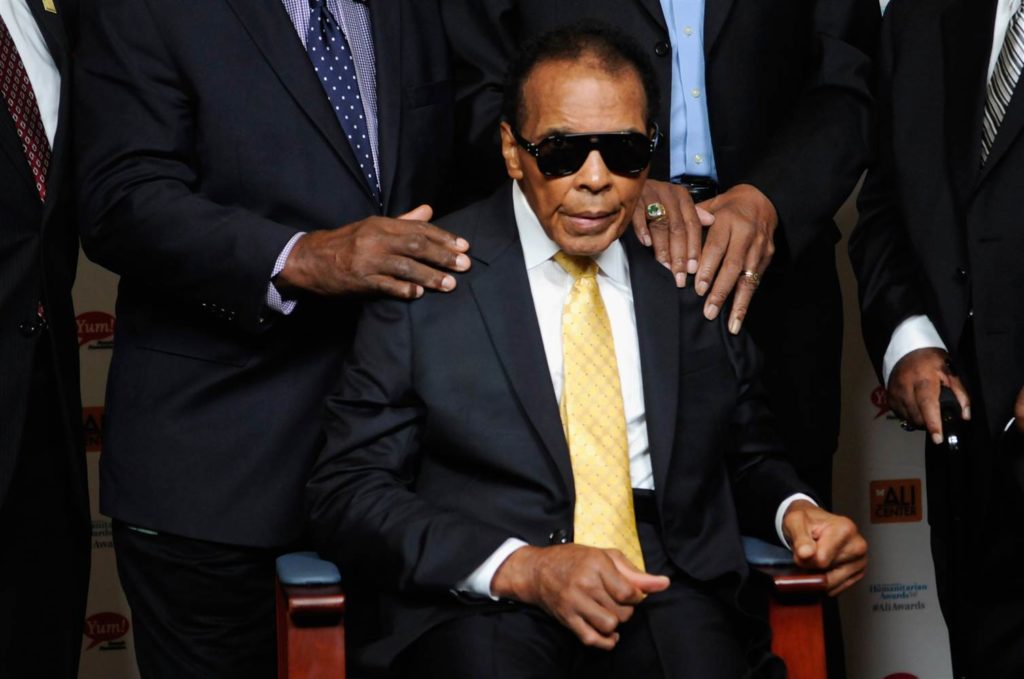
In recent years, Ali’s health had declined dramatically. In 2013, there was a death scare for the family, and just last year, Ali was rushed to the local hospital after being found unresponsive.
During Ali’s final years, he was barely able to carry a conversation. Ali was also asked to share some of his personal philosophy with the NPR back in 2009, where Ali allowed his wife to read his essay:
“I never thought of the possiblity of failing, only of the fame and glory I was going to get when I won,” Ali wrote to the NPR. “I could see it. I could almost feel it. When I proclaimed that I was the greatest of all time, I believed in myself, and I still do.”
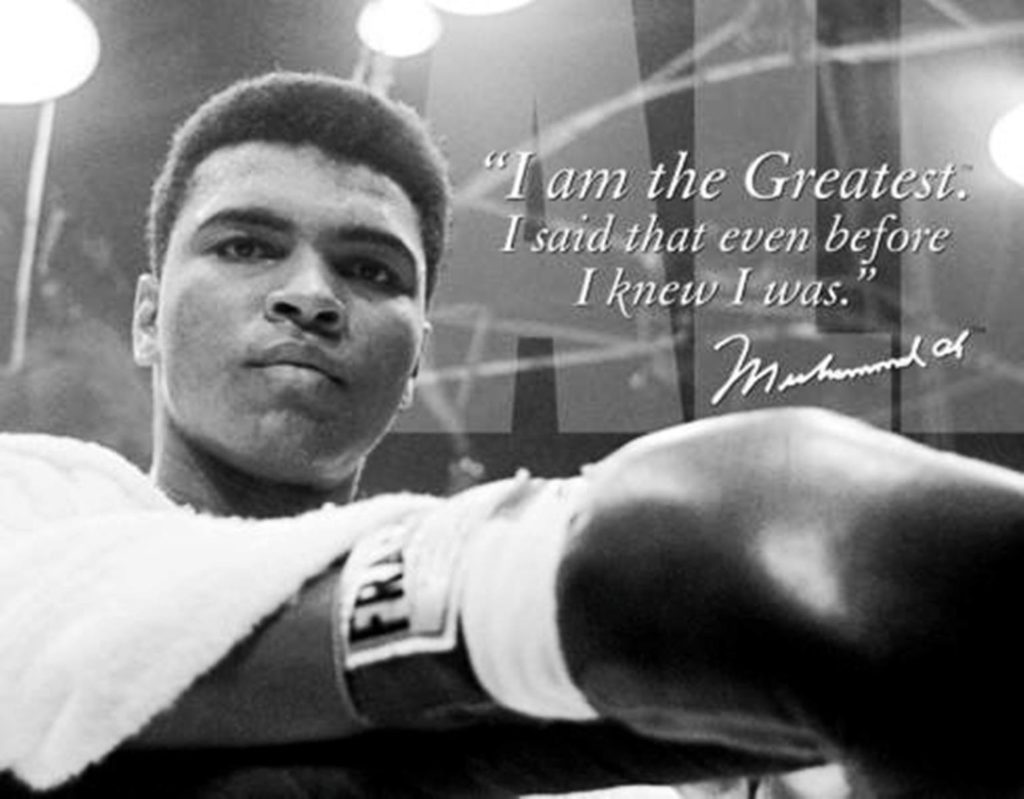
This article (Muhammad Ali “The Greatest of All Time” in Boxing and for his Contributions to Humanity) is a free and open source. You have permission to republish this article under a Creative Commons license with attribution to the author and AnonHQ




